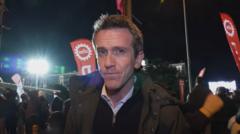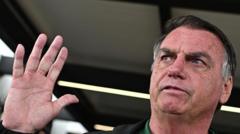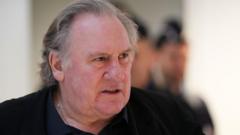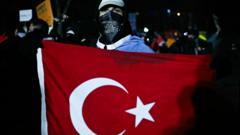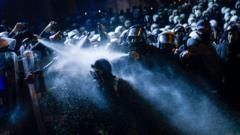The Brazilian Supreme Court has ruled that former president Jair Bolsonaro will be tried for his involvement in a plot to overthrow the government following his electoral defeat in 2022. This decision highlights an important moment in the efforts to uphold democratic principles in Brazil amid allegations that Bolsonaro and members of his inner circle conspired to orchestrate a coup.
Jair Bolsonaro Set to Stand Trial for Alleged Coup Conspiracy in Brazil

Jair Bolsonaro Set to Stand Trial for Alleged Coup Conspiracy in Brazil
Brazil's former president faces serious charges for attempting to undermine democracy post-2022 elections, including a coup and assassination plot.
Former President Jair Bolsonaro has been ordered to stand trial by Brazil's Supreme Court regarding his alleged role in an extensive plot to retain power after losing the 2022 presidential election. The court's ruling indicates serious allegations of an attempted coup and an assassination scheme targeting Brazil’s president-elect, reflecting an urgent push to bring accountability to actions that threaten democratic integrity.
Justice Alexandre de Moraes, presiding over the proceedings, emphasized the overwhelming evidence suggesting that Bolsonaro was aware of and involved in discussions about coup plans. He is being joined in trial by seven associates, including his previous campaign running mate and former intelligence chief, facing charges that include "violent abolition of the democratic rule of law" and a "coup d'état."
During the trial’s initiation, Bolsonaro appeared alongside his legal team but opted not to speak. He has consistently refuted all accusations, labeling them as politically motivated attacks against him. One of his attorneys, Celso Sanchez Vilardi, acknowledged the seriousness of details surrounding the coup plot but distanced Bolsonaro from direct involvement, a stance intended to mitigate the ramifications of the charges on the former leader.
As Brazil navigates this judicial process, civil society is examining the implications of this case not only for the former president but also for the resilience of democratic institutions in the country, amid ongoing political divisions.
The trial is expected to cast a long shadow over Bolsonaro’s political future and the broader political landscape of Brazil, with varying perspectives on justice and accountability emerging from both supporters and critics of the former administration.
Justice Alexandre de Moraes, presiding over the proceedings, emphasized the overwhelming evidence suggesting that Bolsonaro was aware of and involved in discussions about coup plans. He is being joined in trial by seven associates, including his previous campaign running mate and former intelligence chief, facing charges that include "violent abolition of the democratic rule of law" and a "coup d'état."
During the trial’s initiation, Bolsonaro appeared alongside his legal team but opted not to speak. He has consistently refuted all accusations, labeling them as politically motivated attacks against him. One of his attorneys, Celso Sanchez Vilardi, acknowledged the seriousness of details surrounding the coup plot but distanced Bolsonaro from direct involvement, a stance intended to mitigate the ramifications of the charges on the former leader.
As Brazil navigates this judicial process, civil society is examining the implications of this case not only for the former president but also for the resilience of democratic institutions in the country, amid ongoing political divisions.
The trial is expected to cast a long shadow over Bolsonaro’s political future and the broader political landscape of Brazil, with varying perspectives on justice and accountability emerging from both supporters and critics of the former administration.







